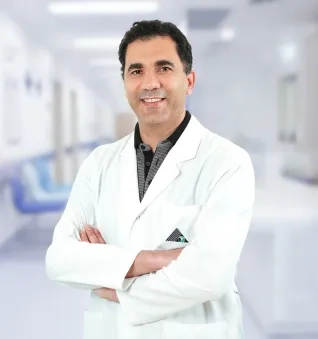Alo Yeditepe
Alo Yeditepe
Kidney Reflux Should Be Suspected in Children with Urinary Tract Infection
Insidious kidney reflux can pose a risk for children. Pediatric Surgery Specialist Assoc. Prof. Dr. Şafak Karaçay, who states that kidney reflux can be seen in 1-2 out of every four children who have urinary tract infections, points out that the diagnosis may be made late due to the lack of obvious symptoms of the disease. Delay is important because it can cause irreversible damage to the kidneys.
Kidney Reflux (Vesicoureteral Reflux) is also an extremely important problem for children. Because delay in diagnosis can lead to results that can progress up to chronic kidney failure. The problem is caused by the backward leakage of urine from the bladder to the ureters and kidneys. This insidious condition causes disease over time. Yeditepe University Kozyatağı Hospital Pediatric Surgery Specialist Assoc. Prof. Dr. Şafak Karaçay says that the incidence of kidney reflux in the normal population is between 0.4 and 1.8 percent. He says that the rate of accompanying kidney reflux in a baby or child who has a urinary tract infection can reach 25 to 50 percent. In other words, kidney reflux can be seen in one or two of every four children who have a urinary tract infection. For this reason, Assoc. Prof. Dr. Şafak Karaçay underlined that kidney reflux should be suspected in children with urinary tract infections, and said, “Renal damage due to kidney reflux was identified as the underlying cause of 5-10% of end-stage kidney diseases, especially in Western countries. It is possible to say that this rate is quite high.”
It Progresses Insidiously
Assoc. Prof. Dr. Şafak Karaçay reminded us that the symptoms of kidney reflux in children are not very clear and continued his words as follows: “That's why you have to be very careful. Due to both the hidden findings and the insidious progression, it is possible to diagnose only when the kidney disease reaches a certain point. Over time, kidney function deteriorates and some metabolic problems may occur, without the family and child noticing. Unfortunately, in cases where early diagnosis is not made and precautions are not taken, a picture that reaches up to chronic kidney failure can be encountered. Studies have shown that most of the adult patients with kidney failure in our country experienced kidney reflux (vesicoureteral reflux) during childhood.”
Who Are at Risk?
Especially children with a family history of urinary tract diseases or congenital diseases, children with a history of kidney reflux (Vesicoureteral reflux) in siblings or parents, and children with frequent urinary tract infections are considered in the risk group for kidney reflux. Although it is suspected that the disease is genetic, there is no concrete evidence on this subject, but it is known that it is commonly encountered among siblings. Assoc. Prof. Dr. Şafak Karaçay reminded us that in some cases constipation may be associated with urinary tract infection, and therefore drew attention to the fact that children experiencing constipation frequently should be followed up for urinary tract infections.
Diagnostic Methods Are Safe for Children
Assoc. Prof. Dr. Şafak Karaçay, who stated that the diagnosis of kidney reflux is extremely easy and that families should not exaggerate this issue, made the following statement about the subject: “Urine culture is primarily used for diagnosis. Another diagnostic method is an ultrasound of the urinary tract which is safe for children and babies. Enlargement of the kidney canals and thickening of the bladder can be detected on ultrasound. In cases where there is a question mark about the disease in the first stage, we use imaging methods called voiding scintigraphy or voiding graphy. Here, we try to see if the medication given to the bladder escapes into the kidney during the child's urination. This is a very safe method. In more advanced cases, renal scintigraphy (DMSA) should be performed to see the damage caused by the disease on the kidneys.”
Treatment Is Shaped by The Source of The Problem
It is necessary to find out the cause of leakage from the bladder to the kidney in kidney reflux in children. Because the treatment method varies according to the cause. Assoc. Prof. Dr. Şafak Karaçay, who explained that only antibiotic use and follow-up can be sufficient for treatment, especially in low-grade reflux, said, “Reducing the pressure in high-pressure bladders, removing obstructions in the outlet can eliminate kidney reflux, and natomical disorders should be surgically eliminated.”
It Is Possible to Be Protected from The Harms of Kidney Reflux
So, is it possible to protect our children from kidney reflux? Yeditepe University Hospital Pediatric Surgery Specialist Assoc. Prof. Dr. Şafak Karaçay said that prevention methods vary according to the cause of kidney reflux. He made the following statement on the subject: “If the problem is caused by an anatomical reason, although it is not possible to prevent the disease, it is possible to protect from the damage it may cause. Unfortunately, there is no attempt we make to prevent this disease from “happening” beforehand. But we have many powerful weapons at our disposal to prevent complications. For example, there are different applications to prevent urinary tract infections and enable the child to urinate comfortably. If there is an anatomical problem, this is revealed, and necessary surgeries are performed. If there is a nervous problem related to the urine flow, different methods of protection are used, such as exercises that will ensure the regular discharge of urine, antibiotic treatment, and increasing the urinary capacity.”
Press Covarage: | hürriyetaile.com | cnnturk.com | sabah.com | mynet.com
About
Faculty and Year of Graduation:
Marmara University Faculty of Medicine (English), 1999
”
See Also
- Poop and Urine Incontinence in Children Can be a Sign of Serious Disorders
- Ingrown Hair Is Not Just an Adult Problem
- Attention to the Genetic and Nutritional Factor: Five Out of Every 100 Children Have a Kidney Stone Problem
- Hernias in Children Should Be Intervented Without Wasting Time
- Does Environmental Pollution Cause an Increase in the Cases of the Hypospadias?
Alo Yeditepe






